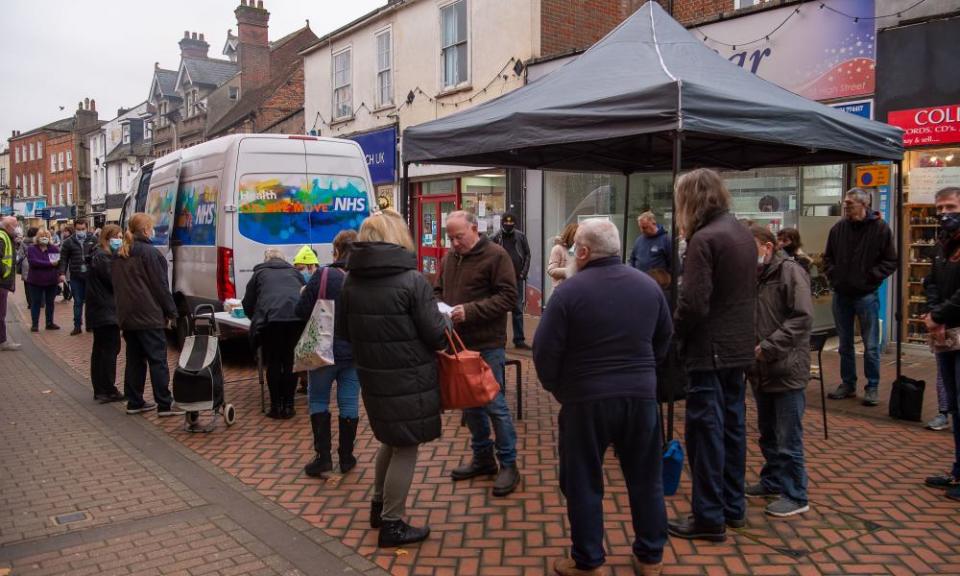What changes have been announced for Covid booster jabs in UK?

All adults over 18 will be offered a third dose as part of bid to tackle spread of Omicron variant
The UK government has accepted advice from its vaccines watchdog, the Joint Committee on Vaccines and Immunisation (JCVI), for one of the biggest immediate changes in the Covid jabs programme. Here is what has been decided and why.
What changes have been announced for booster jabs?
There are two: the age range and the time gap. When boosters – a third dose to top up people’s immunity – were first introduced in September, they were restricted to those over 50 or with clinical vulnerabilities. Earlier this month the age limit was extended to 40. In time, all adults over 18 will be eligible.
Under the original plans, boosters were not supposed to be given until at least six months after the second jab, though people were recently allowed to start booking them after five months. Now the minimum interval has been cut to three months.
So when can I get my booster?
That depends in part on your age and how quickly they can be given. Sajid Javid, the health secretary, confirmed in the Commons that they would be carried out in age order, with 30-39-year-olds expected to be up next. This should be confirmed within days. Even if there is a successful speed-up of the rollout, if you are say, 19, it is likely to be months rather than weeks before you can get your third dose.
What about children aged 12 to 15?
The JCVI has confirmed the widely expected plan for this age group to get a second jab at least 12 weeks after their first. So far, the vaccination rate for this age group is 39.1%, against 67.4% of adults who have had at least one dose. A similar second jab approach for teenagers aged 16 and 17 was agreed earlier this month.
And younger children?
A number of countries have approved Covid vaccinations for children aged five to 11, and this is something the UK could follow. However, the JCVI faces a potentially tricky decision given the limited health risks of Covid to the bulk of younger children. First of all, the medicines watchdog, the Medicines and Healthcare products Regulatory Agency, would need to approve vaccines for use by the age group.
default
And people with suppressed immune systems?
People whose immunity is compromised by conditions such as blood cancer are already eligible for three vaccine doses, although some charities say the rollout has at times been chaotic. They will now be eligible for a booster jab, which will be their fourth dose.
A third dose and booster are not necessarily the same – for example, if someone is given the Moderna vaccine, they will get a full dose for a third injection, but usually a half dose for a booster.
Does the UK have enough vaccine doses for this ramp-up?
Officials involved in the vaccination programme said they expect there will be sufficient doses. A bigger challenge has been trying to encourage uptake among those already eligible.
One official who runs a Covid vaccination site in London said they had experienced a “significant rise” in walk-ins in the last 72 hours, however, with people coming forward for first, second and booster doses. The NHS will still need to carefully stagger when it invites certain age groups to come forward for a booster, the official said, warning that if everyone came forward at once, “that’s when you could run into supply problems”.
Will we need to change the pace of the rollout?
Almost certainly. Javid told the Commons that while he had previously planned for 6m booster jabs to be administered in England over the next few weeks, with the emergence of Omicron he wants “to go further and faster”.
The NHS is currently administering about 350,000 booster vaccines or third jabs a day, or about 2.4m a week across the UK, official figures show. It will have to increase the daily number of jabs to 500,000 a day in order to hit 30m boosters by Christmas Day, according to Guardian analysis.
Has the Omicron variant prompted these changes?
Yes and no. Ministers have long viewed an extended booster programme as a way to reduce winter pressure on the NHS. Second jabs for 12-15-year-olds and boosters for people with compromised immune systems were both expected.
But Omicron greatly increased the pace of decision-making at the JCVI, a regulator that is used to a longer deliberation process. JCVI members were called to an emergency meeting on Saturday and the decision was fast-tracked amid intense government pressure to find ways to limit the impact of the variant. The JCVI is a UK-wide body and it is up to each devolved nation to accept advice, but they almost always do.

 Yahoo Finance
Yahoo Finance 